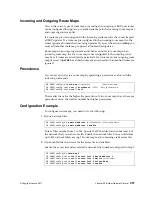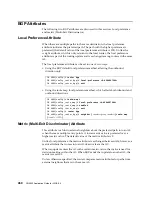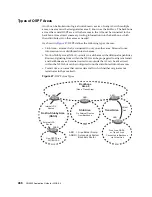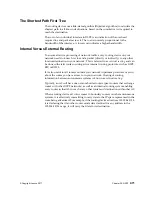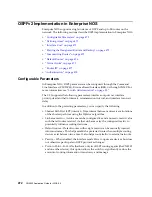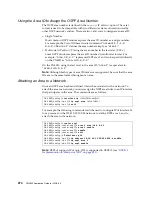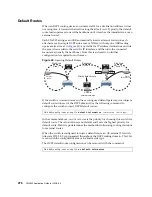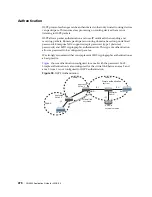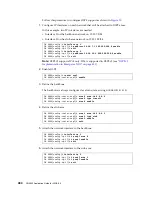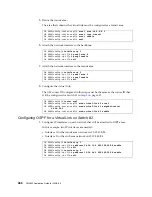
© Copyright Lenovo 2017
Chapter 30: OSPF
471
The Shortest Path First Tree
The
routing
devices
use
a
link
‐
state
algorithm
(Dijkstra’s
algorithm)
to
calculate
the
shortest
path
to
all
known
destinations,
based
on
the
cumulative
cost
required
to
reach
the
destination.
The
cost
of
an
individual
interface
in
OSPF
is
an
indication
of
the
overhead
required
to
send
packets
across
it.
The
cost
is
inversely
proportional
to
the
bandwidth
of
the
interface.
A
lower
cost
indicates
a
higher
bandwidth.
Internal Versus External Routing
To
ensure
effective
processing
of
network
traffic,
every
routing
device
on
your
network
needs
to
know
how
to
send
a
packet
(directly
or
indirectly)
to
any
other
location/destination
in
your
network.
This
is
referred
to
as
internal
routing
and
can
be
done
with
static
routes
or
using
active
internal
routing
protocols,
such
as
OSPF,
RIP,
or
RIPv2.
It
is
also
useful
to
tell
routers
outside
your
network
(upstream
providers
or
peers
)
about
the
routes
you
have
access
to
in
your
network.
Sharing
of
routing
information
between
autonomous
systems
is
known
as
external
routing
.
Typically,
an
AS
will
have
one
or
more
border
routers
(peer
routers
that
exchange
routes
with
other
OSPF
networks)
as
well
as
an
internal
routing
system
enabling
every
router
in
that
AS
to
reach
every
other
router
and
destination
within
that
AS.
When
a
routing
device
advertises
routes
to
boundary
routers
on
other
autonomous
systems,
it
is
effectively
committing
to
carry
data
to
the
IP
space
represented
in
the
route
being
advertised.
For
example,
if
the
routing
device
advertises
192.204.4.0/24,
it
is
declaring
that
if
another
router
sends
data
destined
for
any
address
in
the
192.204.4.0/24
range,
it
will
carry
that
data
to
its
destination.
Summary of Contents for Flex System Fabric CN4093
Page 27: ... Copyright Lenovo 2017 27 Part 1 Getting Started ...
Page 28: ...28 CN4093 Application Guide for N OS 8 4 ...
Page 58: ...58 CN4093 Application Guide for N OS 8 4 ...
Page 72: ...72 CN4093 Application Guide for N OS 8 4 ...
Page 85: ... Copyright Lenovo 2017 85 Part 2 Securing the Switch ...
Page 86: ...86 CN4093 Application Guide for N OS 8 4 ...
Page 98: ...98 CN4093 Application Guide for N OS 8 4 ...
Page 112: ...112 CN4093 Application Guide for N OS 8 4 ...
Page 136: ...136 CN4093 Application Guide for N OS 8 4 ...
Page 156: ...156 CN4093 Application Guide for N OS 8 4 ...
Page 192: ...192 CN4093 Application Guide for N OS 8 4 ...
Page 228: ...228 CN4093 Application Guide for N OS 8 4 ...
Page 229: ... Copyright Lenovo 2017 229 Part 4 Advanced Switching Features ...
Page 230: ...230 CN4093 Application Guide for N OS 8 4 ...
Page 298: ...298 CN4093 Application Guide for N OS 8 4 ...
Page 382: ...382 CN4093 Application Guide for N OS 8 4 ...
Page 392: ...392 CN4093 Application Guide for N OS 8 4 ...
Page 416: ...416 CN4093 Application Guide for N OS 8 4 ...
Page 452: ...452 CN4093 Application Guide for N OS 8 4 ...
Page 466: ...466 CN4093 Application Guide for N OS 8 4 ...
Page 496: ...496 CN4093 Application Guide for N OS 8 4 ...
Page 508: ...508 CN4093 Application Guide for N OS 8 4 ...
Page 510: ...510 CN4093 Application Guide for N OS 8 4 ...
Page 514: ...514 CN4093 Application Guide for N OS 8 4 ...
Page 538: ...538 CN4093 Application Guide for N OS 8 4 ...
Page 539: ... Copyright Lenovo 2017 539 Part 7 Network Management ...
Page 540: ...540 CN4093 Application Guide for N OS 8 4 ...
Page 554: ...554 CN4093 Application Guide for N OS 8 4 ...
Page 576: ...576 CN4093 Application Guide for N OS 8 4 ...
Page 596: ...596 CN4093 Application Guide for N OS 8 4 ...
Page 604: ...604 CN4093 Application Guide for N OS 8 4 ...
Page 609: ... Copyright Lenovo 2017 609 Part 9 Appendices ...
Page 610: ...610 CN4093 Application Guide for N OS 8 4 ...
Page 626: ...626 CN4093 Application Guide for N OS 8 4 ...
Page 633: ......
Page 634: ...Part Number 00MY375 Printed in USA IP P N 00MY375 ...

